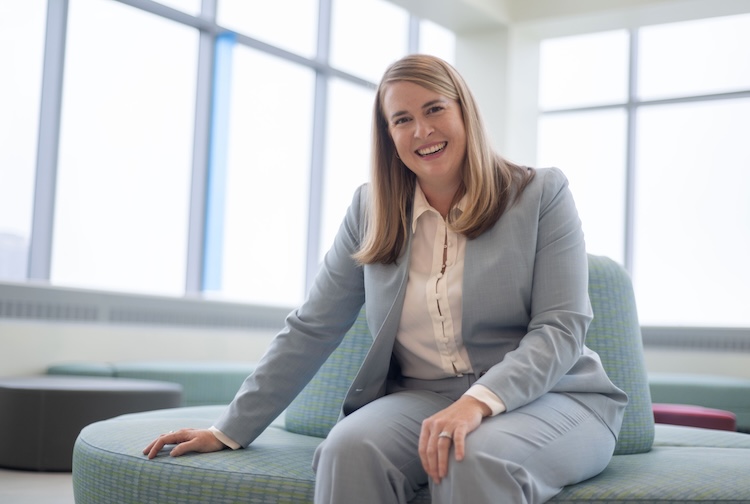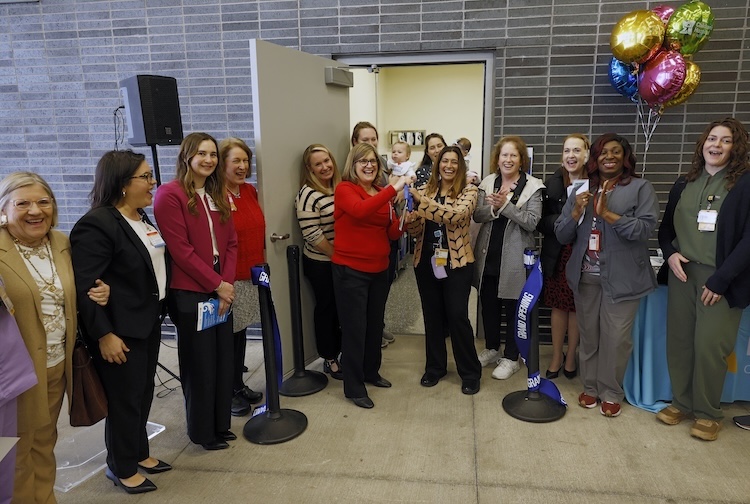Clinical lab science students will soon graduate with the skills to use mass spectrometry, a cutting edge diagnostic technique
VCU courses are the first nationally to teach students both the theory behind mass spectrometry and how to use the technology firsthand.
May 02, 2017

A SCIEX mass spectrometer.
Photo courtesy of SCIEX
Tuesday, May 2, 2017
Mass spectrometry is one of the most accurate analytical techniques used in today's clinical diagnostic laboratories, and workers who know the process are in high demand. Despite this trend, college students across the country don't graduate with sufficient working knowledge of how to apply the technology.
To fill this educational gap, William Korzun, Ph.D., associate professor of Clinical Laboratory Sciences in the School of Allied Health Professions; Dayanjan “Shanaka” Wijesinghe, Ph.D., assistant professor in the Department of Pharmacotherapy and Outcomes Science in the School of Pharmacy; and Lorin Bachmann, Ph.D., associate professor of Pathology and co-director of Clinical Chemistry, VCU Health; collaborated to create new coursework that teaches mass spectrometry to students in the Clinical Laboratory Sciences Department in the School of Allied Health Professions. The partnership also received a donation of software used in mass spectrometry from SCIEX — a leader in mass spectrometry sales — to aid in teaching.
The Virginia Commonwealth University program is the first nationally to teach students both the theory behind mass spectrometry and how to use the technology firsthand.
“VCU is a place that takes the initiative and pride in being entrepreneurial in nature and this is an example of it,” Wijesinghe said. “We have to show that we are creative and innovative in our approaches toward graduating students with the required skill set for tomorrow's workforce."
Wijesinghe and Korzun added a mass spectrometry component to an existing undergraduate course last spring. Bachmann joined the team to help create graduate level courses focused on the technology.
On May 13, a cohort of 24 undergraduates in the Clinical Laboratory Sciences Department will be the first VCU graduates to have completed the mass spectrometry curriculum. The first of three new master's level courses in mass spectrometry was also started this semester.
While the courses are a first, VCU has a longstanding history of mass spectrometry research. The late John B. Fenn, Ph.D., a Nobel Prize-winning professor in VCU's chemistry department, was renowned for his work in electrospray mass spectrometry. The technique is frequently used to gain a deeper understanding of protein interactions and biomolecules. His work has also contributed to significant strides in the development of pharmaceuticals.
A needed skillMass spectrometry is used to identify the presence and amount of specified molecules within a wide range of sample types, such as blood and urine. Two commonly used applications are measuring steroid hormone and vitamin D levels in blood. The technique is valued over many other forms of analysis because of its high degree of accuracy and sensitivity.
While other universities have clinical laboratory science programs with coursework that explains the concept of mass spectrometry, students generally don't learn how to apply the entire process until they are in the workplace.
Marc Browning, a SCIEX sales representative for Virginia and Washington, D.C., said he hopes VCU's mass spectrometry coursework will help provide a thriving workforce of well-trained clinical laboratory scientists. Browning worked to provide SCIEX software to the VCU faculty team.
“It's good to have a pipeline of well-trained local scientists to serve the community. It's beneficial to the economy,” Browning said. “Mass spectrometry is being used locally in clinical diagnostics for biomarker and pharmaceutical analysis, not to mention university research among other uses. There's just a myriad of applications.”
Korzun said spreading the word about the graduate-level mass spectrometry courses and working with more corporate partners (who could provide equipment) are two major goals.
“We want to bring more trained graduates with mass spectrometry skills into the clinical laboratory workplace because it will increase their marketability and fill the growing need in hospitals and reference labs,” Korzun said. “We also hope to get more interest from the vendors who make the instruments to partner with us to bring mass spectrometers into our student lab, to enhance and facilitate the educational process.”
Real world lessonsThe team wanted students to have an understanding of how to use mass spectrometers but wanted to protect VCU's limited and expensive supply of the instrument. This problem was solved with a combination of hands-on learning and observation of a mass spectrometer in operation through a remote live feed.
Undergraduates performed an analysis on their own vitamin D levels. The samples were then taken to a School of Pharmacy lab where students watched via a remote feed as their samples were run through a mass spectrometer. The resulting data was then analyzed by the students using the SCIEX software.
To get a feel for what mass spectrometers look like, students viewed the instruments in the VCU lab and learned how the university's researchers use the technology.
For the master's level courses, Bachmann mapped out the fundamentals clinical laboratory scientists should know to perform mass spectrometry, troubleshoot instrument malfunctions and train others to use the technology.
“I realized there was a serious gap in the current training curriculum and then defined curriculum elements that need to be included to cultivate and properly train individuals in the technology,” she said. “We took into consideration the skill set a student would have coming out of the bachelor's [clinical lab science program] and then what they would need for the master's level.”
Subscribe for free to the VCU News email newsletter at https://news.vcu.edu/ and receive a selection of stories, videos, photos, news clips and event listings in your inbox every Monday and Thursday.




